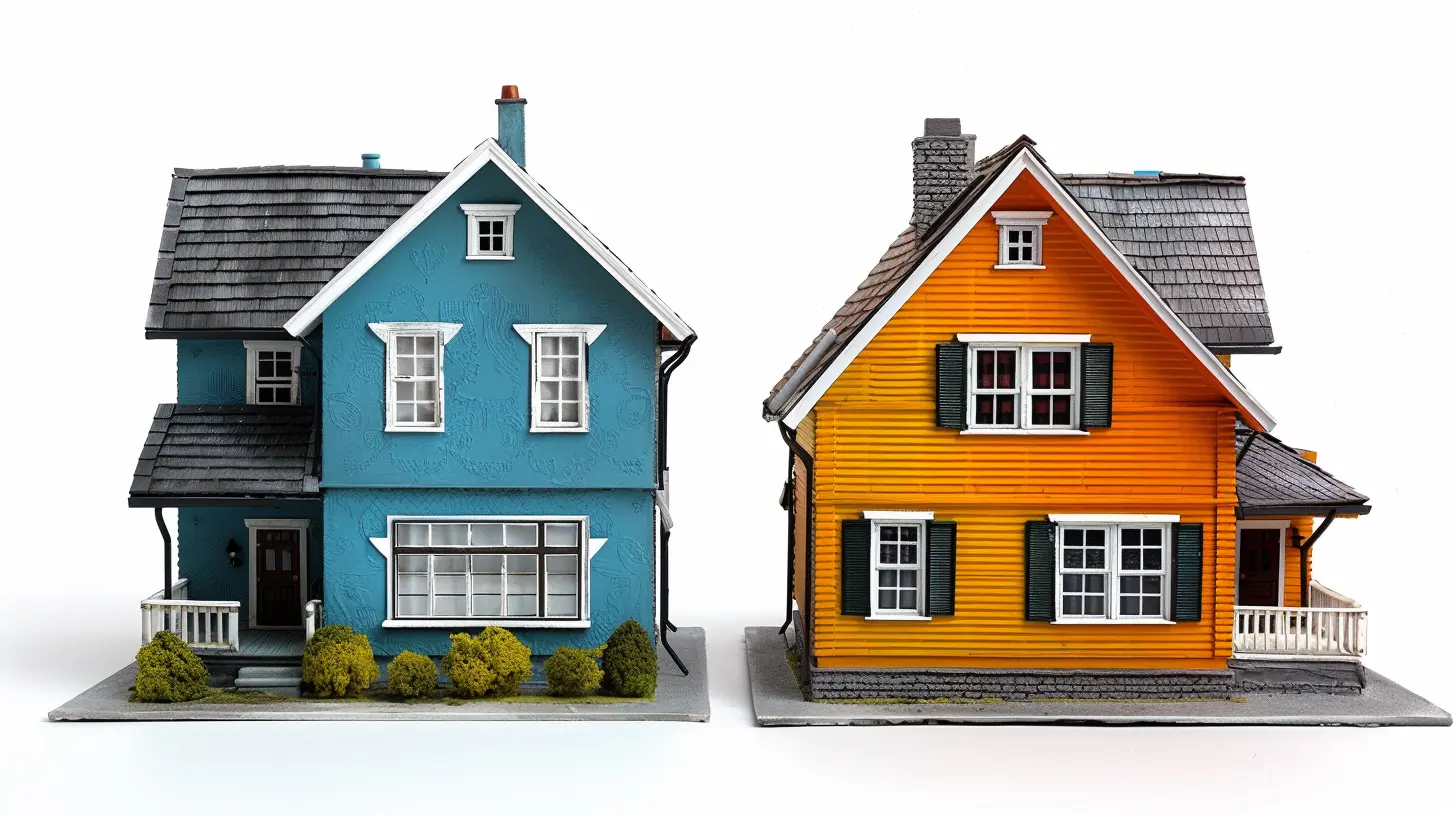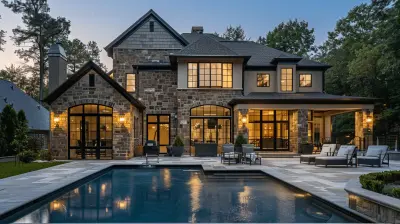22 March 2025
Alright, let’s talk about something that keeps real estate investors up at night—loans. You finally find the perfect investment property, but then comes the big question: Should you go for a short-term loan or a long-term loan? It’s like asking if you want to sprint a 100-meter dash or run a marathon. Both options have their perks and pitfalls, and picking the wrong one could leave you regretting it like eating a gas station burrito on a road trip. So, let’s dive into the pros, cons, and quirks of short-term vs. long-term loans for your real estate ventures.
What Are Short-Term Loans?
Think of short-term loans as the espresso shot of the loan world—quick, intense, and over before you know it. These loans typically last anywhere from six months to a few years, and they’re designed for investors who need money fast and plan to pay it back just as quickly. They’re kind of like borrowing money from your overly enthusiastic friend who expects you to Venmo them back with interest—stat.Short-term loans are often used for:
- Fix-and-flip properties: You buy a fixer-upper, make it Instagram-worthy, sell it, and (hopefully) pocket a nice profit.
- Bridge financing: You’re waiting on another source of funding but need cash now to secure a deal.
- Emergency purchases: When the perfect property pops up and you need to act fast.
Sounds great, right? But hold your horses—short-term loans have some serious strings attached. Let’s explore.
The Good, The Bad, and The Ugly of Short-Term Loans
The Good
1. Speedy Approval: Short-term loans are like the drive-thru of the loan world. Many lenders can approve them way faster than traditional loans.2. Less Stringent Requirements: They tend to focus more on the property’s potential than your personal creditworthiness. Got some skeletons in your financial closet? No problem (sometimes).
3. High ROI Potential: If you play your cards right, these loans can help you make big bucks in a short time.
The Bad
1. High Interest Rates: Short-term loans don’t come cheap. Think of it like paying premium pricing for instant gratification.2. Balloon Payments: Many short-term loans require you to pay a massive chunk of the loan at the end. If you're not prepared, it’s like getting hit with a surprise piñata full of bills (but not the fun kind).
3. Limited Timeframe: You’re racing against the clock. If your project stalls, you could end up in a financial pickle.
The Ugly
Short-term loans are not for the faint-hearted. If your investment strategy doesn’t pan out, you could lose not just your deal but also your dignity. It’s high-risk, high-reward.
What Are Long-Term Loans?
On the other side of the spectrum, we have long-term loans—the comfy recliner of loan options. These loans stretch over decades, typically ranging from 10 to 30 years. They’re like that friend who doesn’t mind if you take your sweet time paying them back, as long as you’re consistent. Long-term loans are what most people think of when they’re planning to buy and hold real estate.Long-term loans are great for:
- Rental properties: Buy a property, find tenants who (hopefully) pay on time, and enjoy a steady income stream.
- Steady investment growth: For investors who prefer a “slow and steady wins the race” approach.
But, as with anything in life, long-term loans also come with their own quirks.
The Yin and Yang of Long-Term Loans
The Good
1. Lower Interest Rates: Long-term loans usually come with more attractive interest rates. It’s like getting a discount for promising to be in it for the long haul.2. Predictable Payments: With fixed-rate loans, you’re signing up for a steady monthly payment—no unpleasant surprises.
3. Less Immediate Pressure: Unlike the ticking time bomb of short-term loans, long-term loans give you breathing room.
4. Tax Deductible Interest: If you’re eligible, you might be able to deduct mortgage interest on your tax returns. Yay for Uncle Sam (kind of)!
The Bad
1. Slow Equity Growth: This isn’t a “get rich quick” scheme. Building wealth with long-term loans is more like watching paint dry—effective but painfully slow.2. Higher Total Interest Paid: Over time, you could end up paying more in interest than the original loan amount. Ouch.
3. Qualification Difficulty: Traditional lenders scrutinize your credit, income, and financial history like a nosy neighbor.
The Ugly
If you suddenly have to sell your property or your tenants stop paying, those monthly payments can turn into a financial black hole pretty quickly. Long-term loans are best for the patient and well-prepared.
How to Choose: Short-Term vs. Long-Term Loans
So, how do you choose between these two loan types? It’s like deciding between ordering tacos or pizza for dinner—you need to consider your goals, timeline, and appetite for risk.Ask Yourself These Questions
1. What’s your investment strategy?- If you’re flipping houses like pancakes, short-term loans are your best bet.
- If you’re building a rental property empire, long-term loans might make more sense.
2. How quickly do you need money?
- Short-term loans are faster, but you’ll pay a premium for the convenience.
- Long-term loans take longer but save you money in the long run.
3. What’s your risk tolerance?
- If you thrive in high-pressure situations, short-term loans might feel exhilarating.
- If you prefer stability and predictability, long-term loans are your jam.
The Middle Ground: Hybrid Loan Options
Now, what if neither of these options feels like the perfect fit? Enter the hybrid loans. These cheeky chameleons combine elements of both short-term and long-term loans. For example, you could get a 7/1 ARM (Adjustable Rate Mortgage), which offers a fixed interest rate for the first seven years before switching to a variable rate. It’s like starting with training wheels and eventually riding the real estate rollercoaster.Real-Life Scenario: Let’s Get Relatable
Imagine you’re a real estate investor named Sam. Sam’s got a fixer-upper in mind but isn’t sure how to finance it. If Sam grabs a short-term loan, he can flip the property quickly and (hopefully) make a tidy profit. But the high interest rates and tight timeframe make him sweat like he’s on a first date.On the other hand, a long-term loan would let Sam turn the property into a rental, earning passive income. However, he’ll be paying off that loan for decades, which feels like forever, especially if he’s already dreaming of his next big project.
What does Sam do? The answer depends on his goals, confidence in the market, and whether he feels like sprinting or taking a leisurely jog. (Spoiler: Sam chose a hybrid loan and lived happily ever after.)
The Verdict: Which Loan Type is Right for You?
At the end of the day, both short-term and long-term loans have their place in the real estate world. It’s not about which one is "better"—it’s about which one aligns with your goals, timelines, and risk tolerance. Choosing between a short-term and long-term loan is like picking between two flavors of ice cream: different vibes, same sweet payoff (if you play your cards right).If you’re still unsure, consult with a financial advisor or mortgage broker. They’re like the GPS of the lending world—they won’t drive for you, but they’ll make sure you don’t end up lost.












Kingston McNeil
This article effectively highlights the pros and cons of short-term versus long-term loans for real estate investments. While short-term loans offer flexibility and quick access to capital, long-term loans provide stability and lower monthly payments. Investors should carefully assess their financial goals and market conditions before making a decision.
April 6, 2025 at 3:34 AM